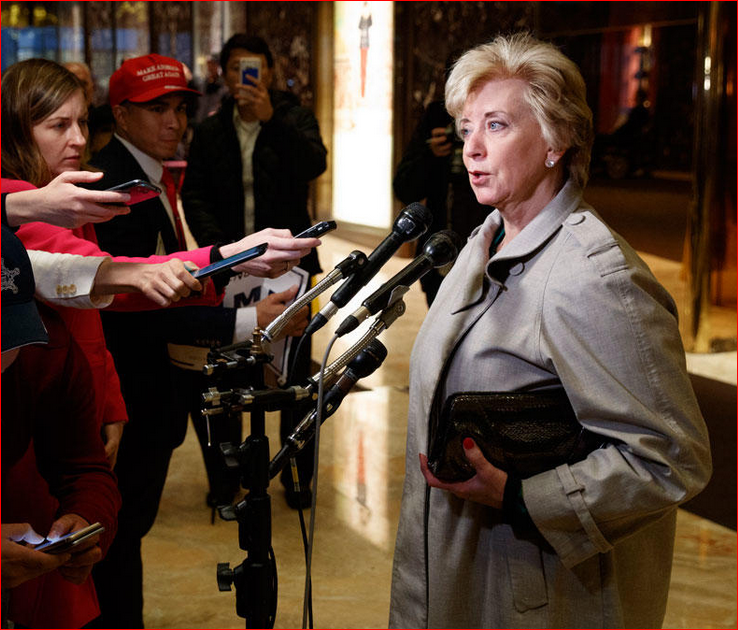From a Business Entrepreneur to a Political One
The Senate easily confirmed WWE co-founder Linda McMahon (81-19) to head the Small Business Administration today. She’s been touted as a businesswoman with her family's business, the WWE, growing from her and her husband’s kitchen table to 800 employees. She related in her testimony a bankruptcy early in the McMahon's career and how it felt to have a car repossessed.
Clearly the McMahons have entrepreneurial drive, the guts to never quit, and to make a business successful. What they didn’t have was a government guarantee of their loans. Of course, during her testimony, what she was quizzed on, was not her entrepreneurial savvy, but how was she going to help women business owners get federal contracts and how she would help our veterans and minority business owners.
Rand Paul, to his credit, looped a soft pitch at her about the regulatory burden born by small business. Unfortunately, this has nothing to do with what the SBA does. As I wrote for mises.org, “Instead of the unfettered market directing capital to successful entrepreneurs, the Small Business Administration (SBA) seeks to direct capital to anyone who thinks they might be an entrepreneur, especially if they fall into certain favored categories of race and gender.”:
Veronique de Rugy argued, in the Wall Street Journal, that the SBA is a waste of money, citing Frederic Bastiat’s insight that those helped by government policy are very visible, while those harmed by the same policy go unnoticed. Ms. de Rugy writes, “we don’t know how many more jobs might have been created if market forces determined the allocation of capital.”
“The SBA has relatively loose criteria,” Entrepreneur Magazine points out, “particularly for its smallest loans. Underwriting is done by banks, but, with the SBA assuming much of the risks for these loans, many banks will offer SBA-backed loans for businesses that wouldn’t otherwise qualify for private market loans. As a result, it lets through ideas that the marketplace has already determined won’t fly. That’s a waste of capital that could be deployed elsewhere.”
The SBA is welfare for bankers, not small business owners. “The real wealth accrues to the big banks,” Ray Hennessey writes. “The SBA’s primary 7(a) lending program guarantees 85 percent of loans up to $150,000 and 75 percent of those from $150,000 to $5 million. The banks issue the loans knowing they can’t lose. If the borrower defaults, the banks get much of their money back from the government.”
What Hennessey doesn’t point out is there is a robust secondary market for SBA loans. They trade almost like any government bond would banks reaping large premiums to sell these government-backed loans in the aftermarket. A bank might earn 8 or 10 ten points by selling a loan. For example, on a $500,000 loan a bank might pocket $40,000 or $50,000 by selling the loan.
With this kind of incentive, banks push money to wanna-be entrepreneurs with the promise of earning big fees, while Uncle Sam shoulders the risk. According to a Dayton Daily News study, “Those 168,324 charged-off loans totaled $8.6 billion in payments to lenders by the SBA. Once discharged, there is little chance the money will be recovered by the government. According to the SBA, the U.S. Treasury's average annual recovery rate between 2010 and 2012 was 0.63 percent of all referred loans.”
It turns out many borrowers paid little on the discharged loans. More than half of these 168,324 charged-off loans, studied by the Dayton Daily News, defaulted before 20 percent of the loan was repaid. “More than a third of borrowers repaid 10 percent or less of the loan. Worse yet, more than 7 percent didn’t pay any principal on their loan at all.
Ludwig von Mises points out,
What distinguishes the successful entrepreneur and promoter from other people is precisely the fact that he does not let himself be guided by what was and is, but arranges his affairs on the ground of his opinion about the future. He sees the past and the present as other people do, but he judges the future in a different way.
It’s clear how Linda McMahon sees her future, not as a business entrepreneur, but as a political one. She has run twice unsuccessfully for the Senate but didn’t give up, donating enough money to attract Donald Trump’s attention to run a Cabinet-level agency. Heading the SBA may not be glamorous but could be a step toward bigger and better political things.
Her past opponents, Richard Blumenthal and Chris Murphy, know Ms. McMahon, her ambition, and her money are a continual threat. To help her on her way (and out of theirs) they not only supported her appointment but introduced her in gushing fashion to The Senate Small Business and Entrepreneurship Committee.
The fact government intercedes in the lending process means capital is being misdirected away from those with proven entrepreneurial ability and toward those who lack the same. SBA proponents claim the program creates jobs, but the billions in losses prove the program destroys capital, and jobs with it. However, SBA offers one plum position: the post Ms. McMahon now has.






